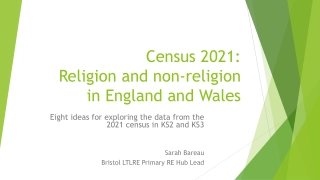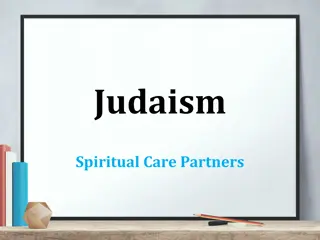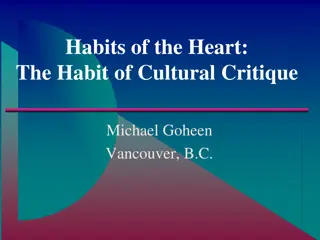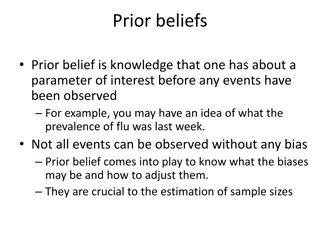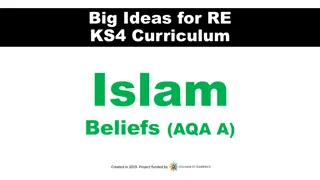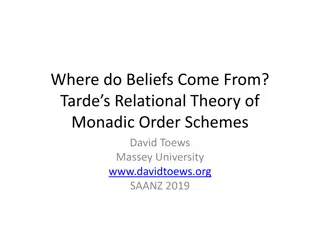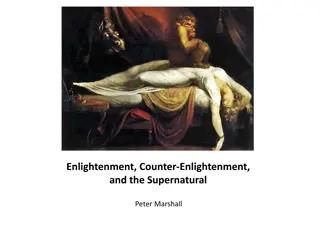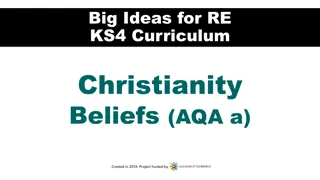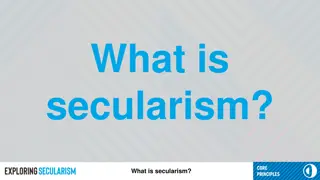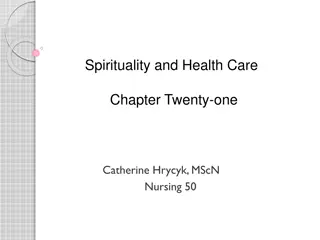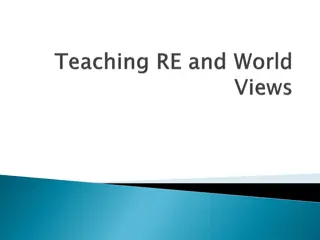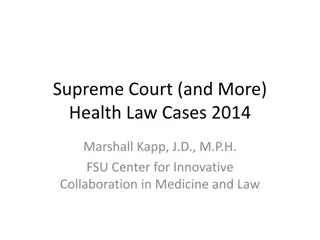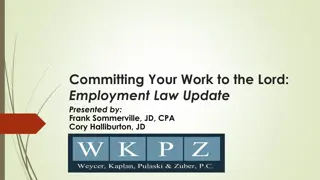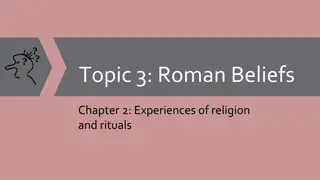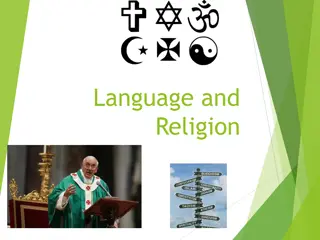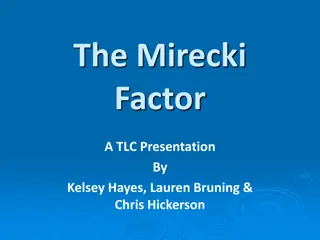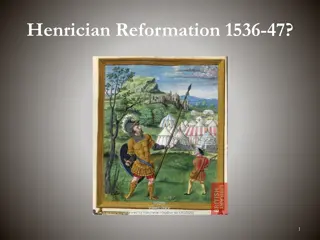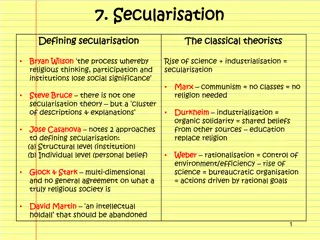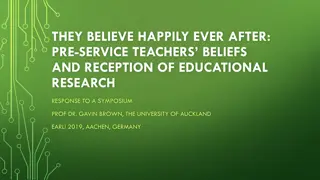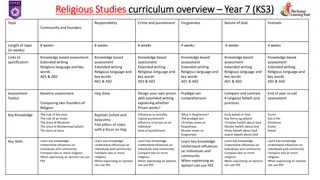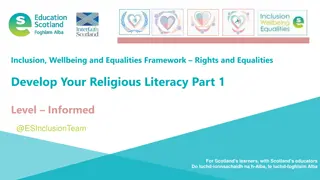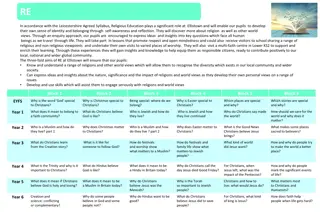Census 2021: Religion and non-religion in England and Wales
Explore ideas for analyzing the religion and non-religion data from the 2021 Census in England and Wales, aimed at KS2 and KS3 levels. Discover trends in percentages, compare global religious beliefs, investigate the distribution of different religions in various regions, and delve into the practice
0 views • 11 slides
Understanding Religious Accommodation in the Workplace
Title VII of the Civil Rights Act of 1964 mandates employers to reasonably accommodate employees' religious beliefs unless it imposes undue hardship. This includes adjustments to the work environment to allow the practice of beliefs. The law also prohibits discrimination and harassment based on reli
4 views • 20 slides
Religious Education Skills Progression for Years 5 and 6
This document outlines the long-term plan for the RE curriculum for Year 5 and 6 students, focusing on topics such as living by Christian values, exploring wisdom from different faiths, understanding the creation of the world, and expressing faith through art. It also covers the progression of skill
0 views • 31 slides
Overview of Religious Studies Course at Ramsey Grammar School
The Religious Studies course at Ramsey Grammar School for Year 9 students covers topics such as Christianity, Islam, Life and Death, Good and Evil, beliefs, practices, and church diversity. Students will be assessed through a written examination at the end of Year 11, with no coursework requirement.
0 views • 23 slides
Understanding Jewish Spiritual Care: Beliefs and Practices
Judaism's spiritual care is rooted in core beliefs such as the existence of God, the Torah, and key tenets of faith. Important aspects include the Jewish calendar, the role of the rabbi in religious guidance and pastoral counseling, and diverse views on the afterlife. Providing spiritual care to Jew
1 views • 12 slides
Understanding Values, Beliefs, and Personal Values in Everyday Life
Our values and beliefs shape how we think, act, and make decisions in everyday life. Whether conscious or not, they influence our behavior and attitudes. This article explores the definitions and importance of beliefs, values, and personal values, highlighting how they impact individual decision-mak
0 views • 27 slides
Understanding the Heart: Cultural Reflections and Religious Insights
Exploring the concept of "habits of the heart" through historical, philosophical, and religious lenses, this content delves into how human behavior is shaped by ingrained customs rooted in the core of one's being, the heart. From cultural critique to religious reflections, the narrative highlights t
0 views • 46 slides
Elizabethan Religious Settlement: Unity Amidst Division
Amid religious division in England, Queen Elizabeth I implemented a Religious Settlement in 1559 to unify the country. The settlement, a blend of Protestant and Catholic elements, aimed to maintain peace and prevent rebellions. Elizabeth's strategic compromise pleased most people, though lingering t
0 views • 14 slides
Cultivating Beliefs: The Garden of Our Minds
In the garden of our minds, our beliefs are the seeds we plant and nurture. Just as we each have our unique soil, we develop beliefs about ourselves, others, and the world. We make decisions based on the strokes we receive from our environment, shaping our script. Reflect on the positive and negativ
0 views • 20 slides
Understanding Prior Beliefs and Eliciting Expert Opinions in Parameter Estimation
Prior beliefs play a crucial role in estimating parameters of interest before observing events. They can be elicited from sources like meta-analyses, literature, and expert opinions. Experts' beliefs are often measured using Beta or Normal distributions for different outcomes. Eliciting prior belief
0 views • 22 slides
Exploration of Islamic Beliefs in the RE KS4 Curriculum
This educational project delves into key concepts of Islam, focusing on beliefs about God as found in the Quran. Through interactive lessons and activities, students explore the significance of Eid ul-Adha, Ibrahim's submission to God, and the roots of Islamic monotheism. The curriculum aims to deep
0 views • 10 slides
The Origins of Beliefs: A Comparative Analysis of Tarde and Durkheim
Gabriel Tarde and Emile Durkheim engaged in philosophical debates on the origins of beliefs within societal structures. While Durkheim saw beliefs as integral to society's moral ideals, Tarde proposed a neo-monadological theory focusing on actors' beliefs within social practices. The discourse quest
2 views • 19 slides
Enlightenment, Counter-Enlightenment, and the Supernatural
The relationship between religion and the Enlightenment was characterized by a shift towards viewing them as non-antagonistic entities, despite some lingering conflicts. While the Enlightenment aimed to combat religious bigotry and superstition, it did not eradicate supernatural beliefs entirely, le
0 views • 8 slides
Exploring Christianity: Beliefs and Key Concepts at KS4
This project delves into the foundational beliefs of Christianity, focusing on key concepts such as the nature of God, the Trinity, Jesus Christ, salvation, the afterlife, and the problem of evil. The curriculum covers diverse interpretations within Christianity, ethical dimensions, philosophical in
0 views • 4 slides
Understanding Religious Language: Cognitivism vs. Non-Cognitivism in the University Debate
This discussion explores the debate between cognitivism and non-cognitivism in religious language. Cognitivism asserts that religious claims aim to describe the world and can be true or false, while non-cognitivism argues that such claims express attitudes and cannot be verified. Flew's challenge qu
0 views • 9 slides
Understanding Secularism: Balancing Freedom of Religion
Secularism encompasses a range of ideas aimed at balancing freedom of and from religion with other rights. It advocates for the separation of religious institutions from state institutions to prevent discrimination and privilege based on religious beliefs. Secularism emphasizes the neutrality of the
1 views • 22 slides
Understanding Spirituality and Health Care in Nursing Practice
Exploring the concepts of spirituality, religious versus secular perspectives, spiritual distress, and the role of nurses in providing spiritual support during times of transition and vulnerability. Spirituality is defined as a sense of meaning in life and inner spirit, central to creating beliefs a
0 views • 11 slides
Exploring the Significance of Religious Education in Cultivating Understanding and Empathy
This content delves into how religious education prompts challenging questions about life's meaning, fosters personal reflection, and encourages empathy and respect for diverse beliefs. It aims to help children explore different religions, develop a sense of identity, and understand the impact of re
0 views • 46 slides
Supreme Court Health Law Cases 2014 Review
The Marshall Kapp, J.D., M.P.H. review of Supreme Court health law cases in 2014 focuses on Burwell v. Hobby Lobby Stores and Conestoga Wood. The cases involved challenges to the Affordable Care Act's contraceptive requirement based on the Religious Freedom Restoration Act of 1993. The court ruled i
0 views • 19 slides
Exploring Religious Beliefs and Social Dynamics in SCLY3: Functionalism vs. Marxism
Delve into the intricate relationship between religious beliefs and social change or stability through the contrasting lenses of Functionalism and Marxism. Unpack the mechanisms by which belief systems impact societal structures and the dynamics of change or preservation. Gain insight into how these
1 views • 58 slides
Employment Law Update: Understanding Ecclesiastical Abstention and Ministerial Exceptions
This update delves into the legal concepts of ecclesiastical abstention and ministerial exceptions within the realm of employment law, focusing on cases where religious institutions are granted autonomy in employment decisions. The discussion includes instances where courts must consider neutral pri
1 views • 22 slides
Roman Beliefs and Religious Practices in Pompeii
Explore the diverse experiences of Roman religion in Pompeii, where worship of multiple gods was common and individuals had the flexibility to honor both official and personal deities. Learn about the tolerant attitude towards religious differences in the Roman Empire and how beliefs evolved over ti
1 views • 6 slides
Understanding the Role of Language in Religion
Exploring the significance of language in religious contexts, this content discusses the functions, features, lexicon, grammar, and metaphorical aspects present in religious language. It delves into how religious language upholds spiritual beliefs, persuades believers, and expresses specific attitud
0 views • 8 slides
Understanding the Cultural Dimensions of Food and Religious Influences in Culinary Arts
Explore the impact of religious beliefs on food traditions and dietary restrictions across different cultures in the culinary world. Learn about the influence of major world religions on eating habits, food choices, and culinary practices. Discover how various religious groups, such as Christians, o
0 views • 26 slides
The Mirecki Factor: Controversy Surrounding Dr. Paul Mirecki's Religious Studies Class
The controversy surrounding Dr. Paul Mirecki's proposed class on Creationism and Intelligent Design at the University of Kansas in 2006 is detailed. It delves into the reactions from various stakeholders such as the administration, legislators, and critics, highlighting differing opinions on the tea
0 views • 13 slides
Masterpiece Cakeshop Case: Religious Beliefs vs. Anti-Discrimination Laws
In the Masterpiece Cakeshop case, Jack Phillips, a devout Christian baker, refused to create a custom wedding cake for a same-sex couple due to his religious beliefs. This led to a legal battle addressing the clash between religious freedom and anti-discrimination laws. The case explores the complex
0 views • 71 slides
Understanding Religious Language: Flew, Hare, Mitchell
Exploring the contrasting views of cognitivism and non-cognitivism in the context of religious language through the perspectives of Flew, Hare, and Mitchell. Delve into Flew's challenge on the undetectable gardener, Hare's concept of bliks, and Mitchell's response to the rationality of religious bel
0 views • 7 slides
Religious Accommodation in the Army: Advising Command
The content discusses the role of the Chaplain Corps in advising Soldiers and leaders on religious accommodation in the Army as of February 13, 2019. It covers learning objectives, legal foundations, Army policies, procedures, recent changes, and references related to religious accommodation. The in
0 views • 36 slides
Henrician Reformation of 1536-47 - Overview of Key Terms and Influences
The Henrician Reformation of 1536-47 was a period of religious change in England, involving shifts in beliefs, worship practices, and organizational structures. This reform was driven both from above, by rulers imposing changes, and from below, with support from ordinary people. Key terms such as Re
0 views • 24 slides
Understanding Religious Discrimination Laws in California Workplace
Learn about the regulations and protections under FEHA and Title VII in California, including religious exemptions, accommodation requirements, case studies, and best practices to address discrimination issues effectively. Discover the statistical insights on religious discrimination complaints and
0 views • 45 slides
Understanding Secularisation: The Decline of Religious Influence in Society
Secularisation refers to the process in which religious thinking, participation, and institutions lose their social significance. This phenomenon is influenced by factors such as the rise of science, industrialisation, changing social attitudes, and the disengagement of the church from society. Evid
0 views • 8 slides
Philosophers' Views on Religious Experience: Insights and Critiques
This lesson delves into the perspectives of various philosophers such as Rudolph Otto, Richard Swinburne, John Hick, and Michael Persinger on religious experiences. It explores concepts like the numinous, religious knowledge, God's existence, and criticisms on the validity of religious experiences.
0 views • 7 slides
Philosophers' Views on Religious Experience: Insights from William James
Explore William James' perspective on religious experiences, including his views on existential and value judgments. Understand how James argued for the validity of religious experiences and their potential proof of God's existence. Delve into the implications of emotions and prior beliefs on interp
0 views • 7 slides
US Religious Freedom Restoration Act (RFRA) Overview
The US Religious Freedom Restoration Act (RFRA) aims to protect the free exercise of religion by ensuring that governments do not substantially burden religious practices without compelling justification. It emphasizes striking a balance between religious liberty and governmental interests through t
0 views • 9 slides
Pre-Service Teachers' Beliefs and Reception of Educational Research
Exploring the awareness and trust of pre-service teachers in educational psychology misconceptions, epistemic trust in educational scientists, questioning prior beliefs when faced with evidence, and beliefs about the instrumental quality of information sources for teaching. The symposium delves into
0 views • 10 slides
Religious Studies Curriculum Overview for Year 7 and 8 (KS3)
Explore various topics such as responsibility, crime and punishment, forgiveness, nature of God, festivals, community, founders, worship, creation, life after death, rules and laws, relationships in this detailed Year 7 and 8 (KS3) Religious Studies curriculum. The curriculum includes assessments, e
0 views • 6 slides
Insights into the Beliefs of the Shang Dynasty
Discover the religious beliefs of the ancient Shang people, including their worship of Shang Di as the supreme deity, the importance of ancestor worship, and the practice of using oracle bones for divination. Explore the tomb of Fu Hao for clues about Shang beliefs and rituals. Engage with images an
0 views • 9 slides
Developing Religious Literacy for Educators in Scotland
This resource aims to enhance educators' understanding of religious literacy by exploring religious discrimination, core beliefs of major faiths, and additional learning sources. It encourages educators to consider the needs of learners in relation to their religious beliefs in Scotland.
0 views • 30 slides
Settling the Northern Colonies: Religious Transformation and Colonization
The Protestant Reformation led to the emergence of Puritanism in the Northern Colonies, with figures like Martin Luther and John Calvin shaping religious beliefs. The Massachusetts Bay Colony stood as a beacon of self-government and religious ideals, while dissenters like Anne Hutchinson and Roger W
0 views • 9 slides
Religious Education Curriculum at Ellistown: Fostering Understanding and Respect
Religious Education at Ellistown aims to enable students to explore various religions and world views, fostering self-awareness and respect. Through inquiry-based lessons, students develop their own perspectives on key questions while engaging with diverse beliefs. The curriculum covers topics such
0 views • 7 slides
